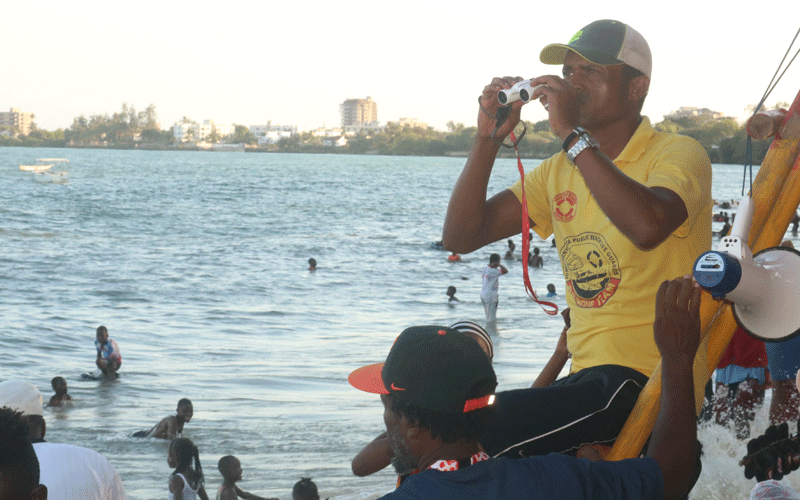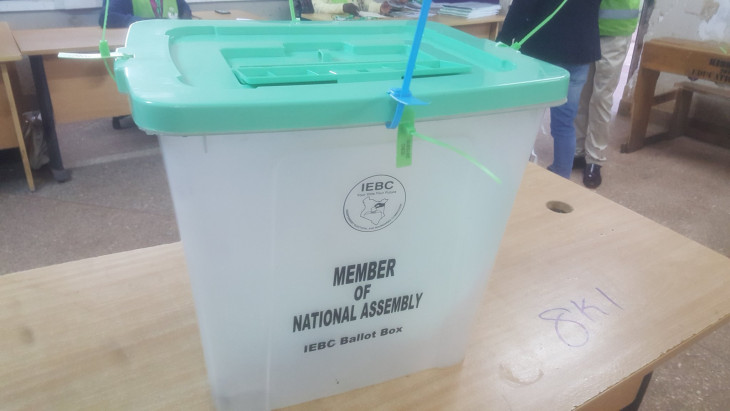I delight in saving lives at the beach

From children who visit Mombasa Public Beach with no adult company, adults who go too far into the waters and nearly drown to those who fall under the hands of notorious sex predators, Hamisi Shane has seen it all for the 18 years he has been a volunteer life guard.
Jasmine Atieno @sparkleMine
In the coastal region of Kenya, the Indian Ocean is a major attraction site for visitors from all over the world.
The feel of the deep waters is therapeutic and the sandy shores; recreational for both locals and visitors.
While the well off and international visitors will have the luxury of cleaner and safer beaches, the public beaches are not that safe.
And there have been many ugly incidences, from sexual harassment in the deep waters to theft and conning of clueless innocent citizens.
This is one of the reasons Hamisi Shane chose to volunteer as a lifeguard at the public beach for nearly 18 years.
The 36-year-old cannot recount how many lives he has saved at the beach since he became a volunteer lifeguard.
From children who visit the beach with no adult company, who he later has to rush to hospital for medical attention and treatment, to adults who go too far into the waters and nearly drown and mostly those who fall under the hands of notorious sex predators.
Even as a little boy and a student at Nyali Primary School where he sat for his Kenya Certificate of Primary Education in 1996, Hamisi was already the best swimmer at his school.
The school had swimming classes and this is where he learned the life skills, which would later serve to save others.
He also got first aid skills training at the school. He later joined Tudor Secondary School, but unfortunately, had to drop out in Form Two after his father passed on and he could not afford to pay his school fees. This is when his journey at the beach began.
Investing in friends
“I would get coconuts and mangoes from our farms and sell them at the beach. But I was not making enough.
So I resorted to selling madafu. I would camp near hotels where there were more white visitors in order to increase my sale.
This is how I made some white friends who saw a potential in me to be more than what I was at that time.
They asked me what I wanted to do. And I told them I would like to join Mombasa Boats Operators Association.
They gave me the funds I needed to join the association,” shares Hamisi.
After paying the Sh25,000 registration fees to join the association, he was trained on how to handle a boat and every other necessary training as an operator.
This gave him an upper hand when his uncle got a boat from Swiss and assigned him to handle all operations.
Unfortunately, all things were put on hold due to post election violence of 2007.
After the post-election violence, he came back to the beach and officially joined life guard volunteer team.
His inspiration to become a lifeguard came from being a firsthand witness of all the bad thing that happen at the beach.
“Not many people are ready to risk their own lives to save another. So, I chose to be one. I have the necessary skills.
The challenge has been in getting the necessary equipments that we need in this line of duty.
Over the years, we have reached out to the county government, but not much has come from it, no funding or any assistance from them,” he says.
The beach currently has 25 lifeguard members who are all volunteers, with Hamisi Shane as their captain.
In 2007, the Royal Navy Lifeboat Institute from the UK donated some equipment to support the volunteers in their work. Since then, they have had to be creative in order to raise funds.
On their own…
The life guards, however, have come up with activities to help them raise money.
This includes having temporary changing rooms, floaters for rent, a canteen at the beach and rental chairs.
This way, they are able to buy necessary medical supplies and repair equipment.
The profit is shared equally amongst the members in order to sustain their personal needs while 20 per cent of all the earnings goes to a savings account.
“We have a meeting every once a week to discuss issues that need to be handled.
Any matter arising that needs urgent aid, is financed from the savings,” says the lifeguard who has become superhero at the beach.
Together with his team, Shane also works with other boat captains who voluntarily help him in his rescue missions.
“The boat captains are the ones who go out into the waters, so it is easier for them to note any irregular activities.
They inform me when something is happening; say if they see a dead body in the water.
Then I request one of the boats to take me out into the waters to confirm, rescue or just deal with the situation at hand. I don’t pay them for this.
The binoculars we have are also of a low power and only see a limited distance. So I am always in need of a ride into the waters,” he adds.
During the festive seasons, the public beach receives the highest visitations of up to 12,000 people a day.
This is a huge number to handle without proper rescue equipments. And with lockdown following the pandemic, all businesses at the beach came to a sudden halt and the shops even demolished.
Therefore, most of the business operators lost their sources of income. Many people went back to their rural homes, including most of the lifeguards in his team. He is only left with nine.












